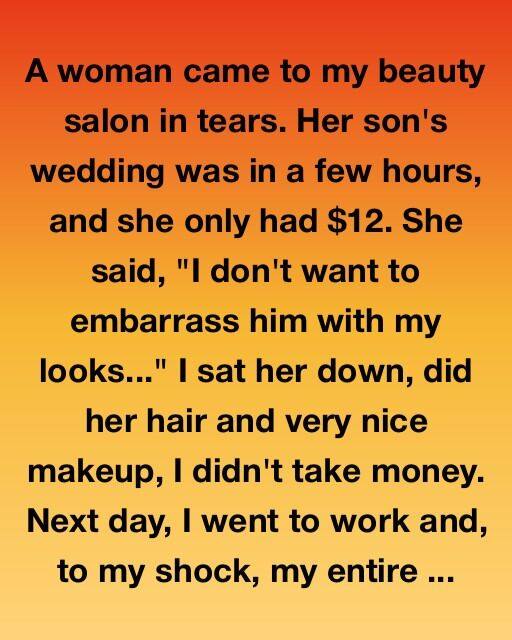She walked into my salon just after sunrise, her shoulders tight, eyes red from crying, hands shaking around a worn purse. I was sweeping the floor, half-listening to the quiet hum of the dryers in the back, when I noticed her lingering near the door, uncertain if she belonged there.
“Can I help you?” I asked, setting the broom aside.
“My son’s wedding is today,” she murmured. “I… I don’t want to embarrass him.”
She pulled out a few crumpled bills—twelve dollars. “It’s all I have,” she admitted, her cheeks flushed with shame.
I didn’t hesitate. “Sit down,” I said gently. “You’re getting the full treatment today.”
Up close, her face told a story—years of quiet struggle and resilience. Her hair was thin and gray, her skin lined, but her eyes still held a soft strength. Her name was Mirela.
As I worked, she shared fragments of her life. How her late husband loved taking her to salons just to see her smile. How she had stopped going after he passed. “He always said I was beautiful,” she whispered. “Even when I didn’t feel like it.”
I styled her silver hair into soft waves, brushed a shimmer across her eyelids, and applied a rose-colored gloss. I didn’t try to make her younger—I wanted her to see herself again, the self she had forgotten.
When I turned the mirror toward her, she gasped. For a long moment, she simply stared. Then her face lit up with a smile so bright it stopped me cold. “Oh,” she whispered, tears in her eyes. “I look like me again.”
She tried to hand me the twelve dollars, but I held her hand and said, “You’ve already paid. Go enjoy the wedding.”
That day passed, but I couldn’t stop thinking about her. Something about the way she carried both grief and grace stayed with me.
The next morning, I opened the salon to find the doorway overflowing with flowers—roses, lilies, wild blooms spilling from mason jars. Among them was a small card: Thank you for seeing me.
I cried right there.
A few days later, a young couple entered. “You did my mother’s hair,” the man said. “I’m Daniel, and this is my wife, Clara.”
They explained the flowers were from them, paid for with their wedding gift money. “She told us you gave her something that day,” Clara said softly. “You helped her find herself again.”
We talked for hours. They invited me to dinner that weekend, and Mirela was there—radiant, laughing, alive in a way she hadn’t been before. When we hugged goodbye, she whispered, “You gave me more than a hairstyle. You gave me courage to show up.”
That night, I couldn’t sleep. Most people come to my salon for a haircut or color. But some come needing something deeper—to feel seen, to feel human again.
Weeks later, her cousin asked if I could help a widower neighbor who hadn’t left his house since his wife passed. I said yes.
He arrived quiet, lost. I trimmed his hair, shaped his beard, and just listened. He spoke of his wife’s laughter, still echoing in his mornings. When he left, he caught his reflection in the mirror and smiled—just a little. Enough to matter.
Word spread. Soon, people came not just for style, but for hope. I started one day a month offering free services for seniors, single parents, or anyone struggling. I called it Give Back Day.
At first it was just me. Then clients left extra tips, notes, or supplies. The little idea grew. A lawyer client helped turn it into a nonprofit: The Mirror Project. Its mission: restore someone’s reflection to restore their spirit.
Other salons joined. We partnered with shelters, cancer centers, nursing homes. Stylists volunteered each month for haircuts, manicures, and makeovers. We weren’t just changing appearances—we were rebuilding confidence, dignity, and connection.
And it all started with Mirela.
Months later, I received a letter from someone signed “M. Roche”:
Dear Sofia,
You may not remember me immediately, but I’ll never forget you. After a long battle with cancer, I’m in remission. When I looked in the mirror this morning, I saw hope—and I thought of you. You didn’t just make me beautiful. You made me feel alive again.
I read that letter over and over before framing it near my station. It reminds me why I do this every day.
Salons are often seen as places of vanity, but they’re not. They’re about dignity, kindness, and reminding someone they matter, even when life wears them down. A mirror reflects more than a face—it reflects a soul. And sometimes, with a little care, that reflection sparks something powerful.
Every time I pick up my scissors, I remember Mirela—her trembling hands, her astonished smile. She came in with twelve dollars and worry. She left with something priceless: hope.
And in return, she gave me something I never expected: purpose.
Every person I touch, every smile that blooms in the mirror, carries a piece of her—the woman who reminded me that true beauty isn’t what we see. It’s what we give.
